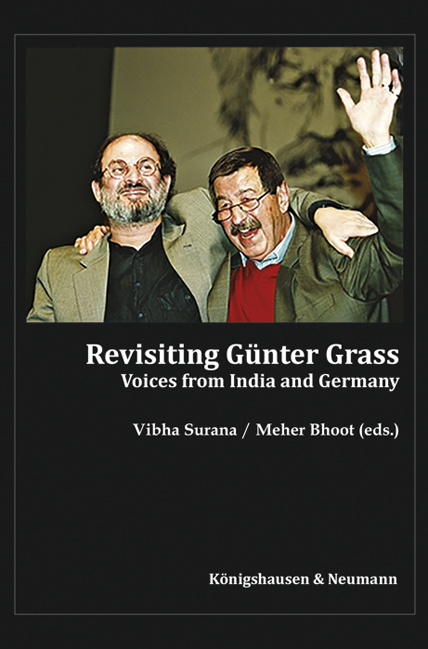Beschreibung
V. Surana / M. Bhoot: so that the crackle continues. Introduction – M. Wälde: I remember – M. Kämpchen: Günter Grass – Thirty Years of Engagement with India. My Reminiscences – S. Dasgupta: From Outspoken Disgust to Warmest Love. Kolkata in Grass‘s Psyche – R. Singh: Dialectics of Self and the Other. Grass‘ Poems What Must Be Said and Europe‘s Disgrace – J. M. George: Günter Grass and the Delicate Episteme of Literature – C. Mueller- Greene: Günter Grass‘s The Tin Drum and Salman Rushdie‘s Midnight‘s Children. Tradition of the Picaresque Novel – S. S. Kumari: Textual Analysis of Günter Grass‘ Dog Years. Refl ections on Human Sufferings from a Hindu/Buddhist Perspective – C. Kumar: The Meeting at Telgte. A fi ctive History of Literature or a Tribute? – J. Sabharwal: Günter Grass‘s Show Your Tongue: City Spaces and Cross-Genre – P. Talgeri: A Voyeuristic Look at Slums and Burning Corpses – P. Talgeri: Can Shylock be Wicked in Germany? – P. Talgeri / S. Dasgupta / K. Nagarkar / V. Khare / A. V.K. Findeis: Writing the Other: Günter Grass and India. Panel Discussion – A. Bhatti / A. Gokhale / S. Mahajan / S. Majumdar / N. K. Narayanan / V. Surana: What Remains. Panel Discussion – H. Koop-mann: Zwischen Steinzeit und Gegenwart oder Die Gleichzeitigkeit des Ungleichzeitigen. Zu den Zeitstrukturen in Günter Grass‘ Der Butt – S. Acharya: Refl exionen zu Günter Grass‘ autobiographischen Schriften. Eine Stimme der „Vergegenkunft“ – M. Durzak: Günter Grass: Der Schriftsteller und das Dritte Reich – S. Mahajan: Was machen die Gedichte hier? Zur ,Liebeserklärung‘ von Günter Grass – V. Ganeshan: Günter Grass und Indien – H. Agrawal: Der kritische Imperativ in Grass‘ Indientexten – A. V.K. Findeis: Zunge zeigen: Kali Rezeption von Günter Grass – G. Damale: „Zeig mal, ob deine Zunge belegt ist!“ Das Protokoll einer feuilletonistischen Fragestunde – S. Mahajan / V. Mahajan: Übersetzung ist ein Wagnis. Ein Gespräch mit Günter Grass in Pune – S. Pathak: Was gesagt werden muss, muss gesagt werden
Die Herausgeberinnen Vibha Surana is Professor of German at the Department of German, University of Mumbai. Meher Bhoot is currently Associate Professor and Head at the Department of German, University of Mumbai.

